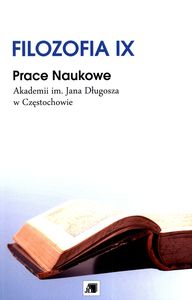Aporetyczna nieodzowność zbawczego istnienia Boga w myśli Miguela de Unamuno
Aporetic Indispensability of God’s Saving Existence in the Thought of Miguel de Unamuno
Author(s): Michał PłóciennikSubject(s): Philosophy, History of Philosophy, Metaphysics, Theology and Religion
Published by: Uniwersytet Jana Długosza w Częstochowie
Keywords: existentialism; immortality; existence of God; salvation; the sense of existence; Miguel de Unamuno; egzystencjalizm; nieśmiertelność; istnienie Boga; zbawienie; sens istnienia;
Summary/Abstract: Issues of the saving existence of God, with the pressure on that salutary dimension, so to speak apart from contradictions of the realism and the idealism, both in the ontological as well as epistemological meaning, doesn’t constitute only a monograph or the mental extra in the philosophy of Miguel de Unamuno. What’s more, it is the one and only par excellence issue of his thinking in principle, which is not equivalent to the to the exceptional nature of the subject; what matters is rather every theological finality of the highlihgted issues.Search and tireless desire for the existence of God in his co salutary interaction with man along with mediated into it reality – the World, focuses in itself and at the same time judges thenerve of source experiencing existence in feeling of the tragedy of life, which in fact is the fearof the chance of annihilation in death, despite the uncontrollable hankering of existence entirelyand for ever in the divine way.And not only every human from blood and bone, but everything that is cogiven along witheach “I” in their consciousness, and therefore everything which somehow exists and is somehow conscious, which seems to be the same. In other words, Unamuno along with the saving dimensionof God existence questions the sense and purpose of any existence, thus forcing the solution of the above aporia – state of puzzlement in the category of all or nothing. Problematyka zbawczego istnienia Boga – z naciskiem na ów wymiar soteryczny, niejako poza sprzecznościami realizmu i idealizmu, zarówno w sensie ontologicznym, jak i epistemologicznym – nie stanowi jedynie przyczynku bądź naddatku myślowego w filozofii Miguela de Unamu-no. Więcej, ona jest w zasadzie jedynym zagadnieniem par excellence jego myślenia, co nie jest równoznaczne z wyłącznością tejże tematyki – idzie raczej o każdorazową teologiczną finalność poruszanych kwestii. Poszukiwanie i niezmordowane pragnienie istnienia Boga w Jego współzbawczej interakcji z człowiekiem wraz z zapośredniczaną w nim rzeczywistością – światem skupia w sobie i zarazem rozstrzyga nerw źródłowego doświadczenia egzystencji, jakim jest „poczucie tragiczności życia”, będące w gruncie rzeczy trwogą przed możliwością unicestwienia w śmierci, wbrew niepohamowanej tęsknocie istnienia w pełni i na zawsze na sposób Boski. I tonie tylko każdego ludzkiego „ja z krwi i kości”, ale wszystkiego, co współ-dane wraz z każdym„ja” w jego świadomości, a więc w ostateczności wszystkiego, co jakoś istnieje i jakoś jest świadome, co zdaje się być tym samym. Innymi słowy: Unamuno wraz z problemem zbawczego wymiaru istnienia Boga stawia na ostrzu noża sensowność i celowość wszelkiego istnienia, niejako wymuszając rozstrzygnięcie powyższej aporii w kategoriach: wszystko albo nic.
Journal: Prace Naukowe Akademii im. Jana Długosza w Częstochowie. Filozofia
- Issue Year: IX/2012
- Issue No: 9
- Page Range: 161-182
- Page Count: 22
- Language: Polish

